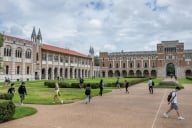You have /5 articles left.
Sign up for a free account or log in.
Presidential election years tend to feature plenty of Cambridge-bashing, especially given the tendency of the Democratic Party to nominate candidates who either live in Massachusetts or went to college there -- and Republican success at portraying Democrats as tied to Cambridge intellectuals as opposed to "average" Americans. Conservatives, including Ivy-educated conservatives, have had great fun at this over the years -- think of William F. Buckley Jr.'s famous quip about preferring to be governed by the first 2,000 names in the Boston phone book than by the faculty of Harvard University.
Sen. Barack Obama, who graduated from Harvard's law school, would appear to be a likely target for such attacks. But as the blogosphere has been noting and analyzing, Hyde Park and the University of Chicago may be replacing Cambridge and Harvard as the pundits' target of choice when it comes to intellectually oriented neighborhoods. Some fear that Milton Friedman may be rolling in his grave now that pundits are suggesting that "Chicago school" might be seen as ... devoid of conservative thought?
This week on "Hardball," Chris Matthews is asking whether Obama is "too University of Chicago?" (Obama taught law there and his wife was an administrator there.)
The new cover story in The Weekly Standard, meanwhile, is called "Mr. Obama's Neighborhood" and argues that despite the fame of Chicago for being home to such conservative and neconservative luminaries over the years as Allan Bloom and Friedman, they are both dead, and many of their disciples "aren't getting any younger," leaving the university's reputation as home for conservative thought "wobbly." The truth about the neighborhood, the article says, it that it's a place where university "paternalism" helps support nice restaurants and new stores.
In language that will no doubt scare many Americans away from Hyde Park, the magazine writes: "A friend once described Hyde Park as 'Berkeley with snow,' and it does indeed have the same graduate-student flavor, the same political activism and boho intellectualism, the same alarmingly high number of men wandering about looking like NPR announcers -- the wispy beards and wire rims, the pressed jeans and unscuffed sneakers, the backpacks and the bikes."
Daniel W. Drezner, formerly of the University of Chicago and now at Tufts University, blogs that it's "a bit odd to imply that Obama is either responsible for or a product of the neighborhood’s odd political economy," but he goes on to question the university's efforts in Hyde Park, writing that "anyone who moved to Hyde Park in the past 20 years quickly figures out all of the costs, benefits, and legacies of the University of Chicago’s longstanding paternalism. Indeed, it would be hard to spend time in Hyde Park and not come away with a sober view of the limitations on governments and non-profit organizations in bettering a place."
It has fallen to The Wall Street Journal to defend Hyde Park and (in a manner of speaking) Friedman's legacy. A column by Thomas Frank Wednesday said: "True, there is a clique of professors in Hyde Park who are 'alien' to working-class interests.... Those professors are conservatives, however: members of the University of Chicago's law and economics departments who have given that institution much of its worldwide fame. Their hostility to the working class is not to be doubted. They have dreamed up ways to get the New Deal ruled unconstitutional. They have railed against labor unions and higher minimum wages while cheering lustily for NAFTA and grotesque pay inequality. At this very moment, in that diabolical neighborhood of Hyde Park, the university is setting up a lavishly funded Milton Friedman Institute in order to better worship the greatest free-market evangelist of them all."
Frank's column also suggests that it's no coincidence that Hyde Park is suddenly the focus of attention in conservative publications. He notes that an article in The Washington Post last week said that Sen. John McCain's campaign was going to cite Obama's choice of living in an academic neighborhood as evidence against him. "Republicans plan to describe Obama as an elitist from the Hyde Park section of Chicago, where liberal professors mingle in an academic world that is alien to most working-class voters."
At Chicago, officials are being careful not to endorse anyone, so Julie Peterson, vice president for communications at the university, framed her comments as being about the institution and its community, not Obama.
She said that the university and Hyde Park "are marked by a wide diversity of ideas and opinions." And while the community produced Harold Washington and Carol Moseley Braun, it has also been home to Milton Friedman and Antonin Scalia, she noted. "Milton Friedman's scholarship, in fact, shaped much of modern conservative economic thought."
The university is not "consistently aligned with a single political party," she said, adding that "in true Chicago fashion, I'd have to say those assertions are simply not supported by the evidence."








